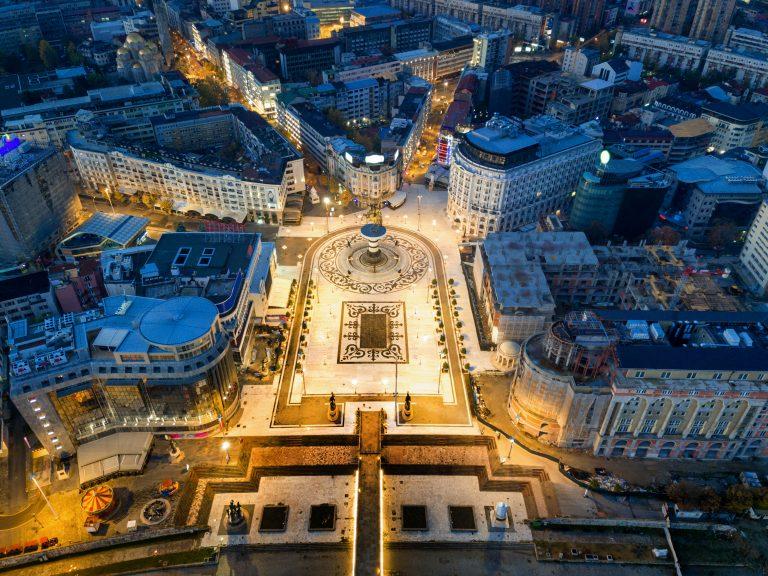
North Macedonia received a boost in its bid to become a member of the European Union this week, with a historic visit from Greek Prime Minister Tsipras.
Whilst all eyes in Europe have been on Westminster as of late, the symbolic visit has signalled the ushering of a new era in another corner of the continent.
Tsipras is the first Greek Prime Minister to visit the nation since 1991, making it a momentous occasion for diplomatic relations between the Balkan nation and Greece.
Historic selfies @Zoran_Zaev and @tsipras_eu, published in newspapers and broadcast on television across Europe, the US, Australia and the United Kingdomhttps://t.co/BYy8xg6p1h
— Republic of North Macedonia in EU (@MKmissionEU) April 3, 2019
https://platform.twitter.com/widgets.jsBack in January, North Macedonia completed a historic deal with Greece putting an end to a decade long feud between the neighbouring nations.
In accordance with the Prespa accord agreed back in the summer, the Balkan successor state became formally recognised by Greece as The Republic of North Macedonia or North Macedonia, for short.
In return, Greece agreed to back its bid to become a member of the European Union. Notably, North Macedonia has been a candidate for accession since 2005.
However, up until recently, Greece had consistently vetoed North Macedonia’s membership for both the EU and NATO, amid an on-going dispute over the region’s previous name.
Greece has long opposed its use of the name amid concerns over the misappropriation of Greek culture and history, in particular referencing the Greek region of Macedonia and the Greek Kingdom.
The dispute has dated back to as far back as World War II.
This only escalated further after the break-up of Yugoslavia and when the Socialist Republic of Macedonia, as it was formally known, gained independence back in 1991.
Whilst the Balkan successor state joined the United Nations in 1993, Greece did not formally recognise the country, instead opting to impose a trade embargo.

However, following the withdrawal of Greek’s veto, the European Union approved the commencement of accession talks with the Republic, with official talks are expected to take place later this year.
Tspira’s visit is the next step in the process to start a new chapter between the two nations, in turn providing a boost to North Macedonia’s global ambitions.
“We are here to build bridges and break down walls,” Tsipras stated at a joint press conference alongside, Zoran Zaev, North Macedonia’s Prime Minister.
“This is a historic moment not only for our countries, but for the Balkans and Europe.”
Similarly, Zaev welcomed the historic moment, he said: “This agreement is an example to be mimicked by all,”
“We showed Europe and the world that with bold decisions anything is possible … Greece is our friend now, she will remain our friend and will become an even greater friend in the future”, He added.
Nevertheless, it’s still a long road ahead for North Macedonia to cement its place among the 28, soon to be 27 member states of the EU.
Consider for instance, Turkey, has also remained a consideration for accession into the union in Brussels since 2005, yet the nation is no closer to securing entry.
When UK Investor Magazine visited the capital back in March, the country was in the midst of coming to terms with the administrative headache of embracing its new name.
Momentum is nonetheless building. Back in February, the country signed an agreement to become the 30th member of NATO, and upcoming EU official talks also indicate progress.
However, its not just the geo-political landscape that is potentially shifting in favour of North Macedonia. The economy is also showing promise.
Companies operating in North Macedonia are also starting to show signs of the economic expansion, with profits soaring at companies listed on the Macedonian Stock Exchange.
Take Makpetrol, the leading distributor of oil and oil products in North Macedonia, as an example.
The company posted a 151% increase in non-consolidated net profit in 2018 in a year that GDP grew 3.7% year-on-year in the final quarter.
The broad GDP increase has been propelled higher by consumer spending with growth rates hitting 9.3% in October 2019, hovering around 7% ever since.
The increase in activity was noticeable in the capital city, Skopje, with busy shops, malls and bazaars enjoying the increased spending of North Macedonians.

In addition, signs of further growth on the horizon were visible by the number of large construction sites in a city that resembles a mix of Middle Eastern traditions and the growth-seeking capitalism of the west.
Granit AD Skopje, an MCE-listed construction firm, is reaping the benefit of this drive having seen share rise over 10% in the past year, as investors position themselves in one of the country’s largest and diverse construction companies.
As a whole, the MCE is up over 50% since the beginning of 2018 and may see further increases if the current economic trajectory is maintained.
